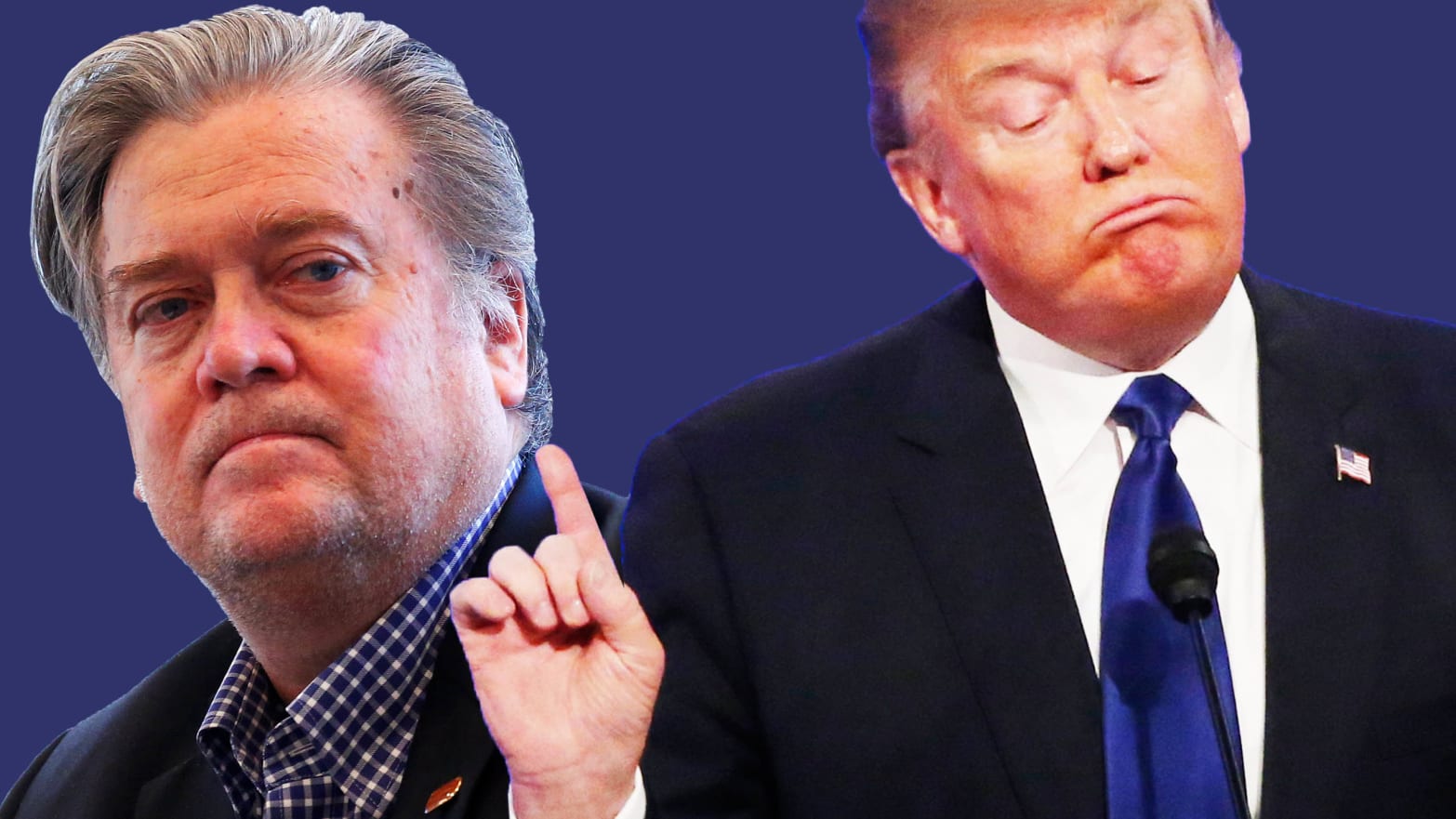The publication Wednesday of salacious excerpts from a new book on the Trump presidency re-opened a major fissure between the president and his former campaign CEO and chief strategist Steve Bannon.
Michael Wolff’s Fire and Fury appeared, on the surface, to turn Bannon from a pariah to a full-on leper within the Republican Party. After it was reported that Bannon had called the meeting of Trump campaign officials—including Trump’s eldest son—and Russian operatives as “treasonous,” Trump followed suit by saying his one-time consiglieri had lost his mind. Don Jr., former communications director Anthony Scaramucci, and the political operation run by Senate Majority Leader Mitch McConnell (R-KY) all took turns gleefully dancing on the Breitbart chairman’s possible political grave.
Lost in it the circular firing squad, was a far more painful reality for the president himself.
He’s isolated.
Bannon may be persona non grata in the GOP, for this news cycle at least. But it is Trump who is forced to navigate a difficult stretch of his presidency with paper-thin alliances, an increasingly cemented perception that he is well out of his depth, and a conservative press corps run by individuals either at odds with him or who think he’s a dope.
Inside the White House, a bunker mentality took hold Wednesday. There was a sense of palpable anger at the quotes Bannon gave to Wolff for his book. According to White House sources, Trump personally dictated key parts of the statement bashing his former chief strategist to senior communications staff, including Communications Director Hope Hicks. He was emphatic about including put-downs such as “Steve Bannon has nothing to do with me or my Presidency. When he was fired, he not only lost his job, he lost his mind,” and “Now that he is on his own, Steve is learning that winning isn’t as easy as I make it look. Steve had very little to do with our historic victory...”
Bannon, of course, had helmed the Trump campaign to victory in 2016, worked as the top strategist in the Trump White House, and remained a close adviser to the president even following his ouster in August. But that relationship appears, yet again, fractured.
“[Bannon] likes talking to reporters as much as the president, maybe even more, and that’s a problem,” a senior Trump aide told The Daily Beast. “Ego does you in.”
According to those who spoke with the president on Wednesday, Trump appeared more furious that Bannon appeared to take too much credit for the 2016 victory, and less focused on the “treasonous” remarks. Members of President Trump’s inner circle, including his immediate family, were instantly enraged on Wednesday after the Bannon excerpts dropped, and began hitting the phones to communicate to friends the imperative of ensuring Bannon is banished in Trump-world.
But the broadside against Bannon obscured the existence of numerous other, similarly biting takes on Trump and his presidency. Wolff quotes News Corp CEO Rupert Murdoch as calling Trump a “fucking idiot.” He quotes former Fox News chief Roger Ailes encouraging Bannon not to “give Donald too much to think about.” The book reports that former deputy chief of staff Katie Walsh thought the White House was incompetently run. Treasury Secretary Steve Mnuchin and former chief of staff Reince Priebus believe Trump to be an “idiot.” Gary Cohn, the president’s top economic adviser, regards Trump as “dumb as shit.” The president’s top national security adviser, H.R. McMaster, considers him a “dope.” Even Trump’s beloved daughter, Ivanka, seems to be in on the gag.
“She treated her father with a degree of detachment, even irony,” wrote Wolff, “going so far as to make fun of his comb-over to others.”
None of this, notably, includes Secretary of State Rex Tillerson own take on his boss. A “fucking moron” is how he reportedly deemed Trump.
Neither the White House nor Bannon returned a request for comment.
Faced with such an overwhelming flood of mockery, the White House took the only route it could: denouncing the book as being built on a series of fallacies. And, indeed, some details seem sketchy (Wolff suggests that Trump didn’t know who former House Speaker John Boehner was despite the two men having once golfed together) and others potentially wrong. Both Walsh, and Trump’s longtime pal Tom Barrack (quoted as calling Trump “crazy” and “stupid”), both claimed they were quoted inaccurately.
But other Wolff sources backed up his reporting.
According to sources close to Bannon, he did not privately dispute to friends, colleagues, and advisers on Wednesday anything attributed to him that appeared in the soon-to-be-released book. He didn’t claim to be taken out context, and instead insisted that he was right, and that these opinions have been his firmly held assessments for months.
Former Trump campaign aide Sam Nunberg, meanwhile, was quoted by Wolff as saying Trump’s limited attention span meant that he couldn’t get a tutorial on the constitution past the Fourth Amendment. Asked if this was true, Nunberg— who, it should be noted, was fired by Trump— told The Daily Beast that the quotes attributed to him were accurate. “I sat with Michael,” he explained. “He is a great writer.” He included, for good measure, a video of Conor McGregor, holding up a championship belt, declaring “from the bottom of me heart I’d like to take this chance to apologize…. To absolutely nobody. The double champ does what the fuck he wants.”
All, of course, is not lost for Trump. The power of his post ensures that he will still have lawmakers, media sycophants, and others who will stick with him through the muck, even if those individuals are more supplicants than true allies.
Wolff’s book, moreover, is hardly the first to shake a White House to its core. In the early days of the Bush administration, Ron Suskind penned a tell all in conjunction with former Treasury Secretary Paul O’Neill that revealed a determination on the president’s part to invade Iraq. Bill Clinton’s longtime aide George Stephanopoulos drew the ire of much of Clinton world when he wrote about the dysfunction of that White House and his personal disappointments with his old boss.
But those crises seem quaint compared to what the current administration faces now—a president polling poorly, with complicated relationships on Capitol Hill, hostile relations with his own cabinet and now openly at war with one of the few outside political apparatuses that was supportive of his agenda.
Wolff’s book portrayed a level of shambolic disfunction at the core of an administration. But it’s central thesis is a president, increasingly and painfully alone.
“If anything I think or hear is true,” said James Carville, another former Clinton aide, “we are just seeing the tiny tip of the iceberg that is coming. And secondly, I think George never accused anyone of treason. That is a serious charge isn’t it?”



